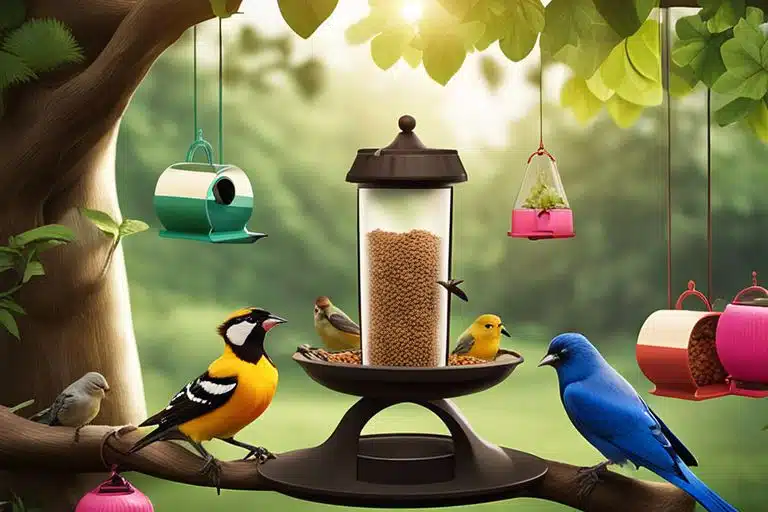Debunking Common Wild Bird Feeding Myths: Truth vs. Fiction for Bird Lovers
As a bird enthusiast, **you’ve** probably heard your fair share of myths about wild bird feeding. From “birds will abandon you if you take a vacation” to “peanut butter causes birds to choke,” these misconceptions can be misleading and even harmful to your feathered friends. But don’t worry, **you’re** about to get the truth! In this article, **we’ll** separate fact from fiction and set the record straight on the 7 biggest bird feeding myths that have been holding you back from creating a haven for your backyard birds. So, grab a cup of coffee, sit back, and get ready to learn the truth about wild bird feeding.
Key Takeaways:
Here are three key takeaways about debunking common wild bird feeding myths:
- Myth-busting is imperative: Many common myths about bird feeding can lead to misunderstandings and misinformed decisions. By debunking these myths, bird enthusiasts can ensure they’re providing the best possible care for their feathered friends.
- Birds need reliable food sources: While it’s true that birds can find alternative food sources, providing a consistent and nutritious supply of food can make a significant difference in their health and well-being. Using high-quality bird seed mixes, sunflower seeds, and suet can help meet their nutritional needs.
- Water is crucial, tooIn addition to bird food, birds need access to clean water for drinking and bathing. Providing a heated water source during winter months can be especially beneficial, as it helps prevent low blood flow and keeps birds healthy.
| Myth | Fact |
|---|---|
| Birds will abandon you if you take a vacation and your bird feeders are empty. | No, birds will find alternative food sources and return to your feeders when you refill them. |
| Only woodpeckers eat suet. | No, many bird species, including chickadees, nuthatches, and titmice, enjoy suet. |
By understanding these common myths and misconceptions, bird enthusiasts can make informed decisions about how to best care for their backyard birds.

Debunking the Myths
While it’s easy to believe that bird feeding myths are harmless, they can actually do more harm than good to our feathered friends. Let’s investigate the facts and debunk these common misconceptions.
Myth 1: Abandonment Anxiety – Will Birds Leave If Feeders Are Empty?
Abandonment fears arise when you’re preparing for a trip and worry that your birds will leave if your feeders are empty. Fear not! Understanding common bird feeding myths will help you provide for them even in your absence. Birds will find plenty of food to survive without your handouts, especially if there are other bird feeders available nearby. Rest assured, they’ll return to your feeding station soon enough, though it may take a bit for them to realize your backyard buffet is open again.
Myth 2: Suet Snobs – Only Woodpeckers Eat Suet?
On the contrary, suet is not exclusive to woodpeckers. While it’s true that woodpeckers love suet, common birds like chickadees, nuthatches, and titmice also munch on suet cakes all year long. Birds that typically pass on seed in feeders may be enticed to try suet on occasion. Tanagers, bluebirds, and a few warblers will nibble the blocks, especially during migration or blustery weather, showing the importance of providing appropriate wild bird food.
For instance, a study found that **over 40 bird species** visit suet feeders, including woodpeckers, chickadees, and nuthatches. So, don’t be afraid to offer suet to attract a variety of birds to your backyard.
Let’s move on to the next myth!
More Myths to Bust
Some bird feeding myths are so ingrained that they’ve become common knowledge, but that doesn’t make them true.
Myth 3: Migration Misconceptions – Does Feeding Prevent Birds from Migrating?
Another myth bites the dust! Feeding birds does not prevent them from migrating. In fact, offering food gives birds a boost before their southbound journeys, helping them fuel up for their travels.
Myth 4: Winter Water Woes – Do Birds Only Need Food, Not Water, in Winter?
Any bird enthusiast knows that water is important for birds’ survival, regardless of the season. Providing a heated water source in winter ensures birds have easy access to open water, which is crucial for their health.
Myths about winter watering often stem from concerns about keeping birds healthy and warm. However, birds need water year-round, not just food. In fact, providing a reliable source of water can be a lifesaver during harsh winter months when natural sources may be frozen. So, don’t forget to keep your birdbath clean and filled with fresh water! Fresh water is as essential as wild bird food for the health of your visitors.
Separating Fact from Fiction
After debunking the first four common wild bird feeding myths, it’s time to probe the remaining three. Let’s separate fact from fiction and give you the truth about peanut butter, cayenne pepper, and more.
Myth 5: Peanut Butter Perils – Does It Cause Birds to Choke?
From the moment you spread peanut butter onto a feeder or log, you might worry that it’ll stick to the roof of a bird’s beak, causing them to choke. Fear not! Beaks are made of smooth keratin, similar to human fingernails, so peanut butter won’t stick. Serve it in a way that keeps it off their feathers, and you’re good to go!
Myth 6: Cayenne Conundrum – Does It Really Keep Squirrels Away?
Keep in mind that sprinkling cayenne pepper in birdseed or around feeders might not be the most effective way to deter squirrels. While some claim it works, others say it doesn’t. The bigger concern is the loose pepper blowing around and getting into a bird’s (or a human’s) eyes.
Does it really keep squirrels away? The answer is unclear. Concentrated capsaicin oils can discourage some animals from eating, but birds aren’t affected by pepper oils. If you’re concerned, try serving safflower seeds, which squirrels tend to avoid. Bear in mind, it’s important to prioritize the health and safety of both birds and humans when it comes to bird feeding.
The Truth About Bird Feeding
Now that we’ve debunked some of the most common wild bird feeding myths, it’s time to focus on what really matters: providing a reliable food source for your feathered friends.
What Birds Really Need – Nutrition and Hydration
The key to successful bird feeding is understanding what birds need to thrive. It’s not just about filling their bellies; it’s about providing the right nutrients to support their overall health. Birds need a balanced diet that includes a variety of foods with high nutritional value, such as sunflower seeds, suet, and fresh fruits and vegetables. Make sure your bird feeders offer these choices. They also need access to clean water for drinking and bathing.
Debunking the Myths – A Recap
What have we learned so far? We’ve busted myths about birds abandoning your feeders if you go on vacation, the idea that only woodpeckers eat suet, and the notion that feeding birds prevents migration. We’ve also set the record straight on the importance of providing water in addition to food, especially during the winter months.
Feeding wild birds is not a one-size-fits-all approach; different species have various bird food preferences. Different species have different needs, and it’s important to understand those needs to create a welcoming and healthy environment in your backyard. By providing a variety of foods and keeping your feeders clean, you can attract a diverse range of bird species and enjoy the many benefits of bird feeding.
Be mindful of, it’s easy to believe myths, but it’s crucial to separate fact from fiction to ensure the well-being of your avian visitors.
Special Considerations
Not all bird feeding scenarios are created equal. There are specific situations that require extra attention to ensure the well-being of your feathered friends.
For example, understanding common bird feeding myths can drastically improve the well-being of your backyard visitors. The Garden Club of Newtown Presents “Bird Myths Debunked… This highlights the importance of understanding the unique needs of different bird species and dispelling common bird feeding myths.
Feeding Waterfowl – What’s Safe and What’s Not?
One of the most critical special considerations is feeding waterfowl, such as ducks and geese. While it may seem harmless to feed them bread, it’s actually **bad for their health**. Bread provides little nutritional value and can cause a range of problems, including **angel wing**, a feather deformity.
Avoiding Harm – Foods to Never Feed Birds
On the other hand, there are certain foods that you should never feed birds, as they can cause harm or even death. These include **uncooked rice**, which can expand in a bird’s stomach, causing serious health issues, and **human foods** like chocolate, onions, and avocado, which are toxic to birds. Such items should never be placed in a bird feeder.
Harm can also come from feeding birds the wrong types of bird food, such as **milo** or **hull cornmeal**, which can make them dependent on humans for food. Instead, opt for **nutritious bird food** that provides the energy and nutrients they need to thrive. Bear in mind, it’s always better to err on the side of caution when it comes to feeding your feathered friends.
b
To wrap up
The next time you’re chatting with fellow bird enthusiasts, you’ll be armed with the truth about common wild bird feeding myths. You’ve learned that birds won’t abandon your feeders if you take a vacation, woodpeckers aren’t the only ones who love suet, and feeding birds doesn’t prevent migration. By separating fact from fiction, you can provide the best possible experience for your feathered friends and enjoy the simple joy of bird feeding.
Debunking Common Wild Bird Feeding Myths: Truth vs. Fiction for Bird Lovers
Q: Will birds abandon my backyard if I take a vacation and my feeders are empty for some time?
A: No, they won’t! While it’s nice to stock up your feeders before heading out of town, don’t worry if they run empty before you return home. The birds will find plenty of food to survive without your handouts. They’ll return to your feeding station soon enough, though it may take a bit for them to realize your backyard buffet is open again.
Q: Do only woodpeckers eat suet?
A: No, they don’t! While woodpeckers do love suet, they aren’t the only ones that enjoy this high-fat treat. Chickadees, nuthatches, and titmice munch on suet cakes all year long. Birds that typically pass on seed in feeders may be enticed to try suet on occasion. Tanagers, bluebirds, and a few warblers will nibble the blocks, especially during migration or blustery weather.
Q: Does feeding birds prevent migration?
A: No, it doesn’t! Migration restlessness, commonly referred to as zugunruhe, is triggered by several factors, including hormones and day length. Instead of preventing migration, offering food gives birds a boost before their southbound journeys. Leading up to migration, they’ll fuel up on food to fill up their caloric gas tanks.
| Myth | Truth |
|---|---|
| Birds will abandon you if you take a vacation and your feeders are empty. | Birds will find plenty of food to survive without your handouts and will return to your feeding station. |
| Only woodpeckers eat suet. | Many bird species, including common birds like chickadees, nuthatches, and titmice, enjoy suet. |
| Feeding birds prevents migration. | Offering food gives birds a boost before their southbound journeys, but doesn’t prevent migration. |
By understanding the truth behind these common myths, you can provide the best possible care for your feathered friends and enjoy the many joys of backyard bird feeding. Happy birding!
As a bird enthusiast with a passion for sharing the wonders of our feathered friends. As a writer and nature lover, I'm thrilled to connect with fellow bird buffs and inspire others to take flight into the fascinating world of birds. Let's wing it together!


